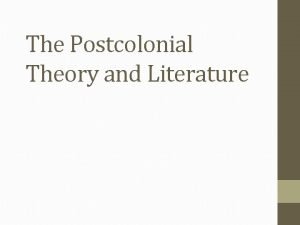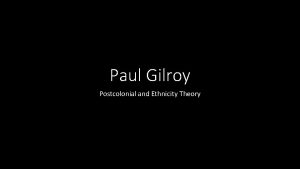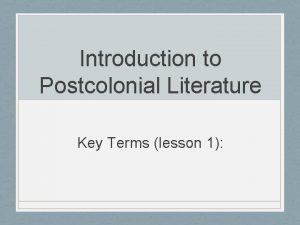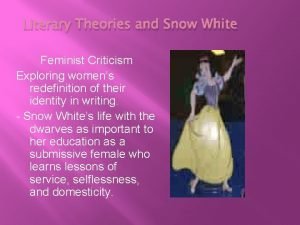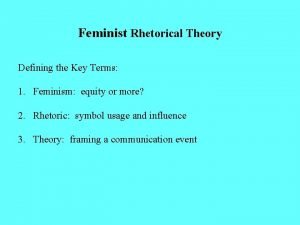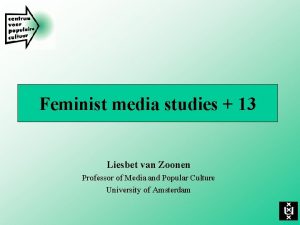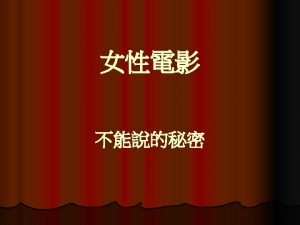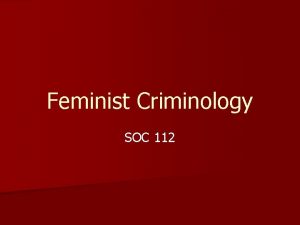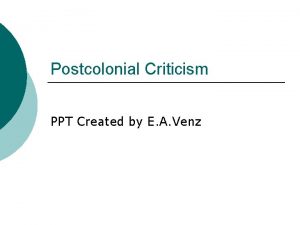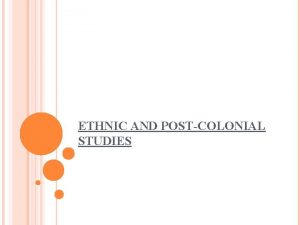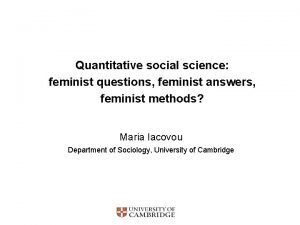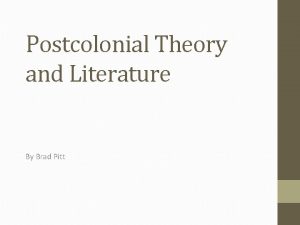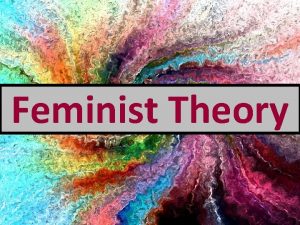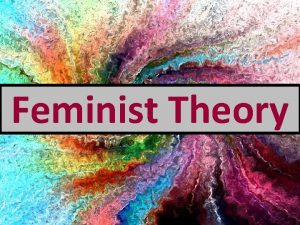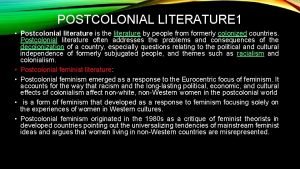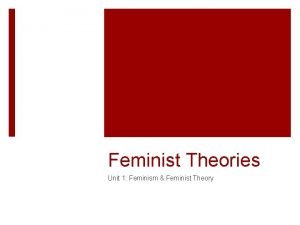PostColonial De Colonial Feminist Theory with special thanks












- Slides: 12

Post-Colonial & De. Colonial Feminist Theory (with special thanks to Catherine Cumming for allowing me to borrow and revise slides 5 & 6)

Anti-Colonialism (Poco) • Post-Colonial Theory • From the South Asian Studies Group • Interrogating British colonial practices 17 th-20 th C • Feminist Post-Colonial Theory (e. g. ) • H. Bhabba, G. Spivak, C. Mohanty, L. Torres, P. Chatterjee • Draws on Marx, Foucault, Derrida • Power/resistance; deconstruction; ideological critique • Replacing historical materialism with “theory from below” • Capitalism’s different forms • Possibilities for transnational solidarities among the subaltern (revolutionary subjects)

Anti-Colonialism (Deco) • Decolonial Theory • W. Mignolo, A. Quijano, A. Escobar • Rising from critique of Spanish, French, Portuguese colonialism beginning in 1400 s • Feminist Decolonial Thinkers (e. g. ) • G. Anzaldua, M. Lugones, R. Segato, J. Paredes, O. Oyewumi • Capitalism and Modernity = the historical outcome of colonialism • Colonialism produces race and racial hierarchy • The Subaltern Can Speak

Colonial Practice and Legacy • Two Spirits clips: • What are the processes of colonialism described? • How is colonialism deconstructed? • How is gender a colonial project? • “Mana wahine, as an extension of Kaupapa Māori, is located in the wider indigenous struggle that has emerged because ‘we’ were unwilling to continue to try and ‘find’ ourselves in the words, texts and images of others” (Simmonds 2011, 13).

Colonial Practice and Legacy • Quijano: ‘Coloniality of Power’ • Racialization produced through colonialism • “blood purity” • Dehumanisation • Lugones: ‘Coloniality of Gender’ • Similar to Simmonds and Mikaere: substituting “gender” for whakapapa & whanau Anibal Quijano (2000): Coloniality of Power, Eurocentrism and Latin America

“Gender Relationality” M. Schippers (2007): Recovering the Feminine Other Gender as: Ø Complementary Differential Hierarchical… & Ø Undergirded by heterosexuality Ø Conceptualising Colonial Power & the “colonial difference”

Lugones & The Colonial Difference • Multiple and overlapping dichotomous hierarchies Coloniser Colonised Human Non-human • Gender as a mark of civilisation vs. Indigenous/ racialised bodies as sexed Gender Sex(ed) • Dehumanisation: justifies exploitation of various forms of labour (see also Simmonds) Lugones (2010): Toward a Decolonial Feminism Man Woman • Subaltern women as resources for the global centre • Reducing women’s sexuality to territory/land

Surviving The Colonial Difference • Simmonds: Colonized men internalised “colonial paternalism” • Anzaldúa’s example of machismo/macho • “The distinctiveness of mana wahine is such that it enables Māori women to analyse and understand our place in the world on our own terms. This is important, as Pākehā feminisms, while able to support us, can never fully account for us” (Simmonds 2011, 21).

Resisting Colonialism • Anzaldúa: BORDERLANDS/LA FRONTERA • Mestiza consciousness • “The work of mestiza consciousness is to break down the subjectobject duality that keeps her a prisoner and to show in the flesh and through the images in her work how duality is transcended. ” (1990, 379) • Versus/Compare: • Mana wahine and hoa mahi • Challenging masculinity through decolonial feminism • “The mestizo and the queer exist at this time and point on the evolutionary continuum for a purpose. We are a blending that proves that all blood is intricately woven together, and that we are spawned out of similar souls” (Anzaldúa 1990, 383).

Transnational Feminism & Neo-Colonialism • Human rights: universalism, anti-universalism, and cultural relativism • Binary thinking: victim/agent; abuser/abused • What is the global basis of women’s oppression? • The neo-colonialism of a ‘politics of virtue’ • The paradox of universalism: “Yet, without some universal concept of humanness and woman, there would be no basis upon which to claim the human rights of women. This tension…forms the crux of the paradox of universalism and the challenge to feminisms interested in finding ways to articulate the global tenor of gender violence without enacting a feminist politics that reaffirms neocolonial agendas” (Hua and Nigorizawa 2010, 406).

Transnational Feminism & Neo-Colonialism • The TVPA and the “coloniality of power” & “coloniality of gender” • Today’s “trafficked woman” is the (new) subaltern of western theory “Through the VTVPA lens, women who have been trafficked are cast as both victimized and yet complicit with cultural conditions that will never allow them the possibility of self-enlightenment; as such, they are never given the opportunity of knowing what has happened to them in the course of being trafficked. Instead, they are perceived as always already lacking such awareness” (Hua and Nigorizawa 2010, 412). “…extending the category of victim—or allowing more women to count as victims—is not the solution since the framework through which victims can be represented is already constrained by orientalist and neo-colonial assumptions of ‘backwardness’ or ‘inability’” (Hua and Nigorizawa 2010, 414).

Sources Cited in Addition to those on the Course Outline Cumming, Catherine. 2016. “Gender Relationality in the Colonial/Modern World. ” Presentation for SOCIOLOGY 735. Erai, Michelle. 2011. “A Queer Caste: Mixing Race and Sexuality in Colonial New Zealand. ” In Queer Indigenous Studies: Critical Interventions in Theory, Politics, and Literature, edited by Qwo-Li Driskill, Chris Finley, Brian Joseph Gilley, and Scott Lauria Morgenson. Tuscon: The University of Arizona Press. Quijano, Anibal. 2008. “Coloniality of Power, Eurocentrism, and Social Classification. ” In Coloniality at Large, Marel Morana, et. al. , eds. Durham, NC: Duke University Press. Schippers, Mimi. 2007. “Recovering the Feminine Other: Masculinity, Femininity, and Gender Hegemony. ” Theory and Society, 36. 1: 85 -102. Springer. doi: 10. 1007/s 11186007 -9022 -4. Spivak, Gayatri. 1988. “The Intervention Interview. ” Southern Humanities Review 22(4): 323 -342 Wolfe, Patrick. 1994. “Nation and Miscege. Nation: Discursive Continuity in the Post-Mabo Era. ” Social Analysis: The International Journal of Social and Cultural Practice 36: 93152.
 Post colonial literature
Post colonial literature Paul gilroy postcolonial theory
Paul gilroy postcolonial theory Post colonial theory
Post colonial theory Postcolonial key terms
Postcolonial key terms Acknowledgement special thanks to
Acknowledgement special thanks to Snow white from a feminist perspective
Snow white from a feminist perspective Van zoonens theory
Van zoonens theory Feminist rhetorical theory
Feminist rhetorical theory Liesbet van zoonen feminist theory
Liesbet van zoonen feminist theory Anneke smelik feminist film theory
Anneke smelik feminist film theory Feminist theory criminology
Feminist theory criminology Postcolonial criticism ppt
Postcolonial criticism ppt Ethnicity in postcolonialism
Ethnicity in postcolonialism
